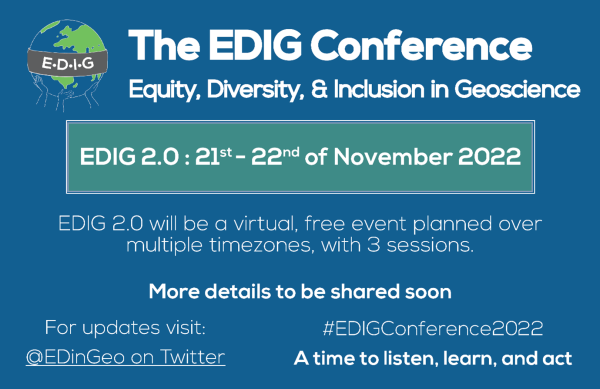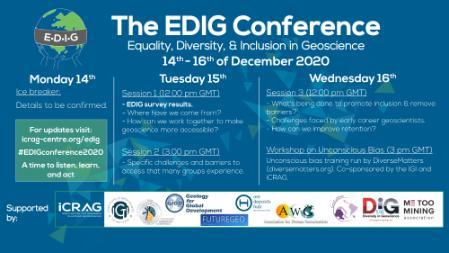Conference

Virtual conference 2022
Key points for the EDIG Conference 2022
-
Conference dates: 21st and 22nd of November
-
Time zones: time zones have been decided with a global audience in mind, with a focus on ensuring global accessibility.
-
Target audience: The EDIG conference is open to everyone who wants to learn about equity, diversity and inclusion (EDI) related challenges and how to promote progressive action to help geoscience become more accessible and inclusive. Regardless of career stage, background, current location or discipline, you are invited to the EDIG conference to listen, learn and act.
-
Structure of sessions: Each session will open with a short introduction, followed by 4 talks by invited speakers, wrapping up with a Q&A with the speakers. Session 1 will include a panel discussion, while Session 2 will host a workshop focusing on unconscious biases.
-
Platform: The conference will be held virtually to allow for a wider reach.
-
Registration link: https://www.eventbrite.co.uk/
e/edig-conference-2022- tickets-442758611927
Session descriptions
- Session 1: The collection and application of equity, diversity and inclusion (EDI) data in geoscience is still emerging, but some challenges remain, including effective data collection, understanding why this data is being collected and what datasets will create the most impact. This session will explore EDI data in geosciences including methods, challenges, biases and reasons for EDI data collection, and with a focus on how data can be used to take action.
- Session 2: Conversations around equity, diversity and inclusion (EDI) can often focus on single underrepresented groups. However, this can lead to people being excluded from these discussions. This session will focus on broader-scale challenges that may impact people from a range of backgrounds, to help improve awareness of the challenges experienced by many geoscientists. We are all still learning, so let's continue to learn together to help make geoscience more inclusive, accessible and equitable.
- Session 3: Creating positive change is challenging. How can we take action and implement change in geoscience? What methods work and what do not? What would a global approach to equity, diversity and inclusion (EDI) in geoscience look like? Is it even possible? Should we try? This session will explore what the next steps for EDI could look like as we continue to move towards more accessible, equitable and inclusive geoscience environments and communities.
Virtual Conference 2020
To help us better understand the challenges faced by many people in the geoscience community, we ran a survey asking people about their experiences with equality, diversity, and inclusion related topics. We used the main results of this survey to help us structure an online, free conference, that ran over the 15/16th of December.
The conference had 3 sessions (talks and panel discussions) and a workshop focusing on unconscious bias. The EDIG project had 14 supporting partners, with the workshop sponsored by iCRAG and the Institute of Geologists of Ireland (IGI).
The conference programme is outlined below and recordings of most talks and discussions are available on our YouTube channel, here: https://www.youtube.com/playlist?list=PLTSbo2wJxJxq6XQeaegqLuRg93JMbgU72
EDIG Conference Programme
Session 1: Where have we come from?
The schedule of talks for Session 1 are listed below (times are shown in GMT).
- 12.00 pm. Launch of the EDIG conference (Prof. Murray Hitzman).
- 12.05 pm. Background to EDIG: Who we are (Aileen Doran).
- 12.15 pm. EDIG survey results summary (Dr. Jess Franklin).
- 12.30 pm. Introduction to session 1 (Dr. Fergus McAuliffe)
- 12.40 pm. Geoscience and the questions of inclusivity: A historical perspective (Prof. Pratik Chakrabarti).
- 12.55 pm. 50 years in geo. How far we’ve come & how far we need to go (Prof. Suzanne O’Connell).
- 1.10 pm. Under-represented, not rare: We are here (Dr. Hendratta Ali).
- 1.25 pm. Translating lived experiences and why this matters (Nicole Doucette).
- 1.40 pm. Stronger together (title to be confirmed) (Dr. Rocío Caballero-Gill).
- 1.55 pm. Panel discussion.
- 2.30 pm. End of session 1.
Session 2: Where are we now?
The schedule of talks for Session 2 are listed below (times are shown in GMT).
- 3.00 pm. Introduction to session 2 (Hazel Gibson).
- 3.10 pm. Challenging inappropriate workplace behaviours as allies & bystanders for a safe, respectful & inclusive workplaces (Susan Lomas).
- 3.20 pm. Race and racism: underrepresented groups in geoscience (Dr. Kuheli Dutt).
- 3.30 pm. Disability/ableism including mental health (Martin Griffin).
- 3.40 pm. Navigating and succeeding in rocky spaces with a brown face (Dr. Anjana Khatwa).
- 3.50 pm. Socio-economic status & mental health (Dr. Brooke Johnson).
- 4.00 pm. LGBTQ+ (Dr Craig Poku)
- 4.10 pm. Intersectionality of challenges (title to be confirmed) (Alejandra Gomez Correa).
- 4.20 pm. Panel discussion.
- 5.00 pm. End of session 2.
Session 3: Where are we going?
The schedule of talks for Session 3 are listed below (times are shown in GMT).
- 12.00 pm. EDIG Day 2 introduction (Dr. Anna Bidgood).
- 12.10 pm. Introduction by session chair (Dr. Sarah Gordon).
- 12.20 pm. Early career professional: Shaping the future of geoscience (Lucy Crane).
- 12.30 pm. Inclusive academia: A pipeline to industry (Prof. Ben Mapani).
- 12.40 pm. Reporting (Dimitra Christakou).
- 12.50 pm. An audit for action: BAME representation in the geosciences (Ben Fernando).
- 1.00 pm. Six simple steps to make fieldwork more accessible and inclusive (Anya Lawrence).
- 1.10 pm. Panel discussion.
- 2.00 pm. End of conference wrap up and future steps closing remarks (Aileen Doran).
The EDIG Team
A time to listen, learn, and act.



